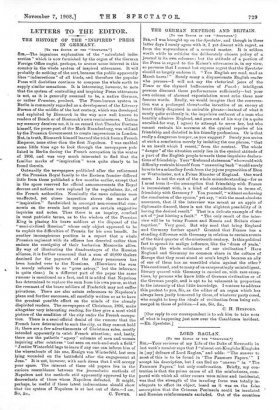LETTERS TO THE EDITOR.
THE HISTORY OF THE "INSPIRED" PRESS IN GERMANY.
[TO THE EDITOR Or THE " SPECTATOR."]
Sra,—The ingenious explanation of the " calculated indis- cretion" which is now furnished by the organ of the German Foreign Office ought, perhaps, to arouse some interest in this country in the whole system of inspired utterances. It will
probably do nothing of the sort, because the public apparently likes "indiscretions" of all kinds, and therefore the popular Press will doubtless continue to compass the whole earth to supply similar sensations. It is interesting, however, to note that the system of controlling and inspiring Press utterances is not, as it is generally assumed to be, a native German, or rather Prussian, product. The Press-bureau system in Berlin is commonly regarded as a development of the Liter:ar•y Bureau of the middle of the last century, which was developed and exploited by Bismarck in the way now well known to readers of Busch or• of Bismarck's own reminiscences. Unless my memory deceives me. it is on record that Theodor Fontane himself, the prose-poet of the Mark Brandenburg, was utilised by the Prussian Government to create impressions in London. But, in truth, Bismarck himself learned the trick from a French Emperor, none other than the first Napoleon. I was enabled some little time ago to look through the newspapers pub- lished in Berlin during the French occupation in the winter of 1806, and was very much interested to find that the familiar marks of "inspiration" were quite clearly to be found therein.
Outwardly the newspapers published after the retirement of the Prussian Royal family to the Eastern frontier differed little from those published a few months earlier, except that in the space reserved for official announcements the Royal decrees and notices were replaced by the regulations, &c., of the French authorities. Nominally the news columns were unaffected, yet closer • inspection shows the marks of "inspiration." Sandwiched in amongst non-committal com- ments on the events last reported are certain suggestive inquiries and notes. Thus there is an inquiry, couched in most patriotic terms, as to the wisdom of the Prussian King :in placing his brave soldiers at the disposal of the " senii.civilised Russian" whose only object appeared to be to exploit the difficulties of Prussia for his own benefit. In another inconspicuous position is a report that a whole Prussian regiment with its officers has deserted rather than endure the contiguity of their barbarian Muscovite allies. By way of illustrating the disadvantages of the Russian alliance, it is further rumoured that a sum of 40,000 thalers destined for the payment of the Army pensioners has been handed over to the Russians. (Elsewhere the sum is merely referred to as " gone astray," but the inference is quite clear.) In a different part of the paper the same rumour is mentioned as a fact, and it is added that Napoleon has determined to replace the sum from his own purse, so that the remnant of the brave soldiers of Frederick may not suffer privations. There are also astute references to Napoleon's plans and further successes, all carefully written so as to have the greatest possible effect on the minds of the already dispirited readers. The newspapers of Christmas, 1806, make altogether very interesting reading, for they give a most vivid picture of the condition of the city under the French occupa- tion. There is a semi-official denial of the rumour that the French have determined to sack the city, as they cannot hold it; there are a few advertisements of Christmas sales, mostly intended apparently to catch French attention ; and, lastly, there are the pathetic "agony" columns of men and women inquiring after relatives " last seen on such-and-such a field." "Justice Winterfeld begs to learn if any one can inform him of the whereabouts of his soap, Ensign von Winterfeld, last seen lying wounded on the battlefield after the engagement at Jena." It is not, however, with such items that I will occupy your space. The interest of these old papers lies in the curious resemblance between the journalistic methods of Napoleon and the methods still apparently approved by the descendants of those whom Napcleon defeated. It might, perhaps, be useful if these latest indiscretions should show that the system of Napoleon is at last out of date.—I am,




























































 Previous page
Previous page